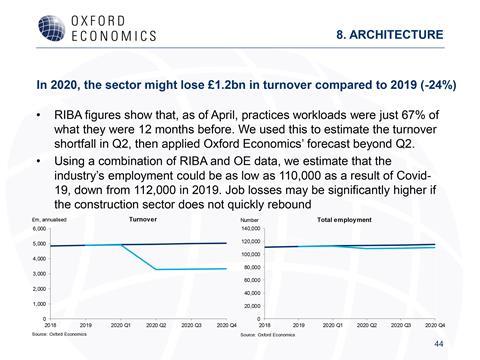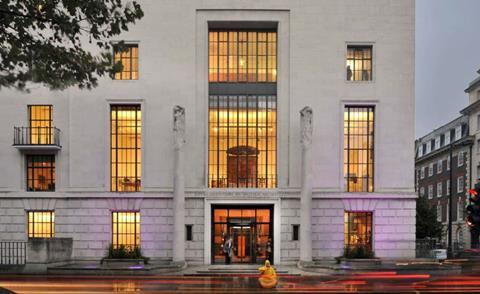Profession could take £1.2bn hit from covid amid ‘cultural catastrophe’, economists warn
Architecture is projected to lose more than £1bn in revenue as a result of the coronavirus pandemic, according to research published today.
And 1,800 architects and their colleagues could lose their jobs, warns the report by Oxford Economics. That represents 2% of jobs in architecture, the authors said, but they added that job losses could be significantly higher if the construction sector does not rebound quickly. In a separate announcement the Construction Leadership Council warned of a 9.9% reduction in the construction workforce in the next three months, with 43% of firms anticipating making redundancies in the longer term. They said up to 20% of their workforces would be affected.
Today’s report, The Projected Economic Impact of Covid-19 on the UK Creative Industries, looks at the cost of covid across the creative sector. It was commissioned by the Creative Industries Federation which predicted a “cultural catastrophe” and urged the government to set up a cultural renewal fund.
It said the UK’s creative industries were “on the brink of devastation”, with 119,000 permanent jobs set to be shed once the job retention scheme is wound up and 287,000 freelance roles expected to be terminated by the end of the year.
The predicted loss of one in five jobs from the sector equates to almost triple the workforce of Asda in the UK.
Today’s report projects that the creative sector will be hit twice as hard as the wider economy in 2020, with a projected GVA shortfall (a measure of economic productivity) of £29bn which equates to a drop of 25%.
It points out that the UK’s creative sector was previously growing at five times the rate of the wider economy, employing more than two million people and contributing £111.7bn to the economy – more than the automotive, aerospace, life sciences and oil and gas industries combined.
Many fields are expected to lose more than half their revenue and over half of their workforce, with music, film, theatre, publishing, crafts, galleries, fashion and design all affected.
Architecture’s projected £1bn loss, which equates to a 24% fall in revenue, comes as practices are warning of the return of heavy fee discounting which was a feature of the 2008 recession.
The latest RIBA Future Trends survey of practices reported workloads were 33% lower than in May 2019. It also said 22% of architectural staff had been furloughed, while 1% of those responding have already been made redundant.
Today’s report follows the Creative Industries Federation’s open letter to government in April calling for urgent funding for the creative sector, which was signed by 500 leading figures.
Caroline Norbury, the federation’s chief executive, said: “Our creative industries have been one of the UK’s biggest success stories but what today’s report makes clear is that, without additional government support, we are heading for a cultural catastrophe.”
The creative industries were needed now more than ever and were the industries of the future, she said.
She added: “If nothing is done, thousands of world-leading creative businesses are set to close their doors, hundreds of thousands of jobs will be lost and billions will be lost to our economy. The repercussions would have a devastating and irreversible effect on our country.”

RIBA chief executive Alan Vallance said: “Architecture is a major contributor to the UK economy but, like other creative sectors, the RIBA and our members are extremely concerned about the future, with predictions for future work at an all-time low.
“Architects, working with others within the creative industries, have a vital role to play in re-energising the economy and building and strengthening communities. We need the government to invest in a green economic recovery, for the sector and the country.”
Sarah Weir, chief executive of the Design Council, said: “The job losses and financial cost identified here are severe enough to warrant urgent action from government.
“Designers and design businesses will be at the forefront of our national and global response and recovery from this pandemic. They will be providing innovation and people-centred solutions from rethinking the way private offices and public buildings function to the health, environmental and education services we need and the products that must become more sustainable and less impactful on our world.”

















2 Readers' comments